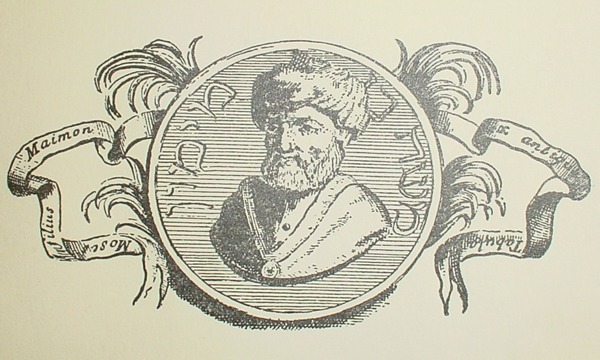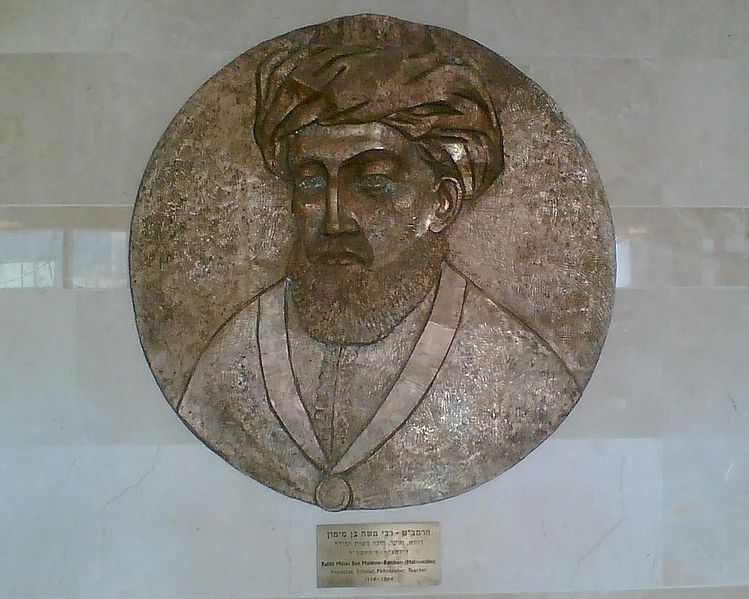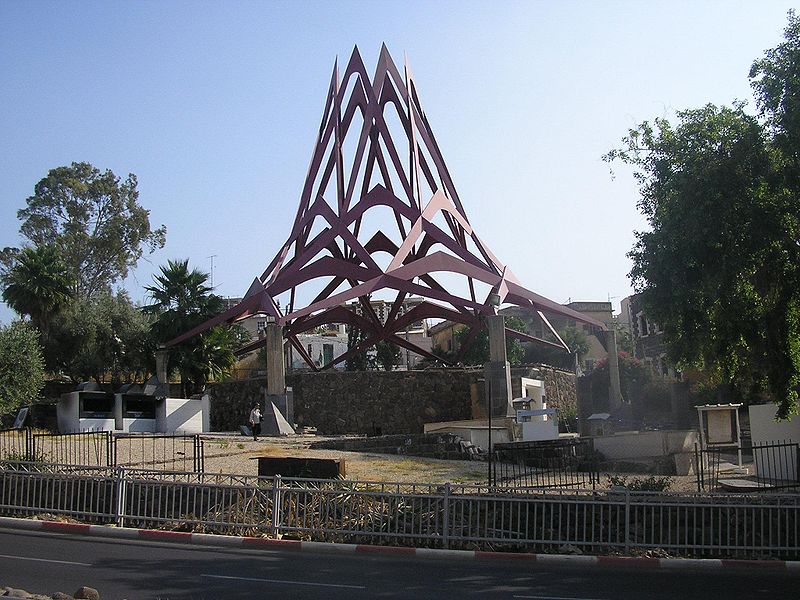<Back to Index>
- Philosopher Moses ben Maimon (Maimonides), 1135
- Poet Paul Marie Verlaine, 1844
- Field Marshal Erhard Milch, 1892
PAGE SPONSOR
ΕΚΛΟΓΕΣ 2012
Τυπώστε και Ψηφίστε

Moses ben-Maimon, called Maimonides and also known as Rambam, was the preeminent medieval Jewish philosopher and one of the greatest Torah scholars and physicians of the Middle Ages. He was born in Córdoba, Spain, on Passover Eve, 1135, and died in Egypt on 20th Tevet, December 12, 1204. He was as a rabbi, physician and philosopher in Morocco and Egypt.
Although his writings on Jewish law and ethics met with respectful opposition during his life, he was posthumously acknowledged to be one of the foremost rabbinical arbiters and philosophers in Jewish history, his copious work a cornerstone of Jewish scholarship. His fourteen volume Mishneh Torah still carries canonical authority as a codification of Talmudic law. In the Yeshiva world he is known as "Hanesher Hagadol" (the great eagle) in recognition of his outstanding status as a bona fide exponent of the Oral Torah, particularly on account of the manner in which his Mishneh Torah is elucidated by Chaim Soloveitchik.
His full Hebrew name is Rabbi Moshe ben Maimon (Hebrew: רבי משה בן מימון), whose acronym forms "Rambam" (רמב"ם). In Latin, the Hebrew "ben" (son of) becomes the Greek style suffix "-ides" to form "Moses Maimonides". His full Arabic name is Abū ʿImrān Mūsā bin Maimūn bin ʿUbaidallāh al-Qurṭubī al-Israeli ( ابو عمران موسى بن ميمون بن عبد الله القرطبي الإسرائيلي) or Mūsā ibn Maymūn (Arabic: موسى ابن ميمون) for short.
Maimonides was born during what some scholars consider to be the end of the golden age of Jewish culture in Spain, after the first centuries of the Moorish rule. At an early age, he developed an interest in the exact sciences and philosophy. In addition to reading the works of Muslim scholars, he also read those of the Greek philosophers made accessible through Arabic translations. Maimonides was not known as a supporter of mysticism.
He voiced opposition to poetry, the best of which he declared as false,
since it was founded on pure invention — and this too in a land
which had produced such noble expressions of the Hebrew and Arabic muse. This Sage,
who was revered for his saintly personality as well as for his
writings, led an unquiet life, and wrote many of his works while
travelling or in temporary accommodation. Maimonides studied Torah under his father Maimon, who had in turn studied under Rabbi Joseph ibn Migash - a student of Isaac Alfasi.
The Almohads conquered Córdoba in 1148, and threatened the Jewish community with the choice of conversion to Islam, death, or exile. Maimonides's family, along with most other Jews, chose exile. For the next ten years they moved about in southern Spain, avoiding the conquering Almohades, but eventually settled in Fes in Morocco, where he studied at the University of Al-Karaouine. During this time, he composed his acclaimed commentary on the Mishnah in the years 1166 – 1168.
Following this sojourn in Morocco, he and his family briefly lived in the Holy Land, before settling in Fostat, Egypt, around 1168. While in Cairo he studied in Yeshiva attached to a small synagogue that bears his name. In the Holy Land, he prayed at the Temple Mount. He wrote that this day of visiting the Temple Mount was a day of holiness for himself and his descendants. Maimonides shortly thereafter became instrumental in helping rescue Jews taken captive during King Amalric's siege of the Egyptian town of Bilbays. He sent five letters to the Jewish communities of Lower Egypt asking them to pool money together to pay the ransom. The money was collected and then given to two judges sent to Palestine to negotiate with the Crusaders. The captives were eventually released. Following this triumph, the Maimonides family gave their savings to the youngest son David, a merchant, in the hopes of expanding their wealth. Maimonides directed him to procure goods only at the Sudanese port of Aydhab, but, after a long arduous trip through the desert, David did not like the goods offered in the port city. So he boarded a ship to India against his brother's wishes since great wealth was to be found in the East. Sadly, David drowned at sea sometime between 1169 – 1170 before he could make it to India. The death of his brother caused Maimonides to become sick with grief. In a letter discovered in the Cairo Geniza, he later explained:
The greatest misfortune that has befallen me during my entire life — worse than anything else — was the demise of the saint, may his memory be blessed, who drowned in the Indian sea, carrying much money belonging to me, him, and to others, and left with me a little daughter and a widow. On the day I received that terrible news I fell ill and remained in bed for about a year, suffering from a sore boil, fever, and depression, and was almost given up. About eight years have passed, but I am still mourning and unable to accept consolation. And how should I console myself? He grew up on my knees, he was my brother, [and] he was my student.
Following his recovery, he was appointed the Nagid of the Egyptian Jewish community around 1171. Arabist S.D. Goitein believes the leadership he displayed during the ransoming of the Crusader captives led to this appointment. But
since the Maimonides family had their savings tied up in David's
business venture, when he drowned, all of that money was lost. This
forced Maimonides to take up his famous vocation as a physician.
Maimonides was trained as a physician in Córdoba and in Fes. He
gained widespread recognition and became a court physician to the Grand
Vezier Alfadil, then to Sultan Saladin, after whose death he remained a physician to the royal family. In
his writings he described many conditions including asthma, diabetes,
hepatitis, and pneumonia, and emphasized moderation and a healthy life
style. His
treatises became influential for generations of physicians. He was
knowledgeable about Greek and Persian medicine, and followed the
principles of humorism in the tradition of Galen, however, he did not blindly accept authority but used his own observation and experience. Frank,
however, indicates that in his medical writings he sought not to
explore new ideas but to interpret works of authorities so that they
could become acceptable. Maimonides displayed in his interactions with patients attributes that today would
be called intercultural awareness and respect for the patient's
autonomy. In
a famous letter, he describes his daily routine: After visiting the
Sultan’s palace, he would arrive home exhausted and hungry, where "I
would find the antechambers filled with gentiles and Jews ... I would
go to heal them, and write prescriptions for their illnesses ... until
the evening ... and I would be extremely weak."
Maimonides died on the 20th of Tevet 4965 (December 12, 1204) in Fustat, Egypt where it is believed that he was shortly buried before being reinterred in Tiberias, a town on the western shore of the Sea of Galilee, Lower Galilee, Israel. However the location of Maimonides grave is not without controversy and in the Jewish Cairene community there is tradition that maintains that his grave has remained in Egypt.
Maimonides and his wife, the daughter of one Mishael ben Yeshayahu Halevi, had one child, Avraham, who was recognized as a great scholar, and who succeeded him as Nagid and as court physician at the age of eighteen. He greatly honored the memory of his father, and throughout his career defended his father's writings against all critics. The office of Nagid was held by the Maimonides family for four successive generations until the end of the 14th century.
He is widely respected in Spain and a statue of him was erected in Córdoba in the only synagogue in that city which escaped destruction; although no longer functioning as a Jewish house of worship, it is open to the public.
He is sometimes said to be a descendant of King David, although he never made such a claim.
Maimonides was one of the most influential figures in medieval Jewish philosophy. A popular medieval saying that also served as his epitaph states, From Moshe (of the Torah) to Moshe (Maimonides) there was none like Moshe.
Radical Jewish scholars in the centuries that followed can be characterised as "Maimonideans" or "anti-Maimonideans." Moderate scholars were eclectics who largely accepted Maimonides's Aristotelian world-view, but rejected those elements of it which they considered to contradict the religious tradition. Such eclecticism reached its height in the 14th – 15th centuries.
The most rigorous medieval critique of Maimonides is Hasdai Crescas' Or Adonai. Crescas bucked the eclectic trend, by demolishing the certainty of the Aristotelian world-view, not only in religious matters, but even in the most basic areas of medieval science (such as physics and geometry). Crescas's critique provoked a number of 15th century scholars to write defenses of Maimonides. A translation of Crescas was produced by Harry Austryn Wolfson of Harvard University, in 1929.
Maimonides also had an important influence on the great Church theologian Saint Thomas Aquinas. There are explicit references to Maimonides in several of Aquinas's works, including the Commentary on the Sentences.

